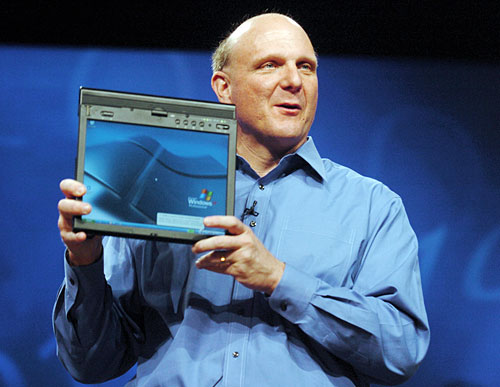The Portable Window

Tablets are coming. Bigger than an phone, thinner than a netbook. Maybe they will become the new electronic books. A few months before Steve Jobs demoed the iPad, the editors at Wired asked me (and a bunch of others) to imagine what tablets might become. They rightly did not want us to be swayed by the features of the iPad, so this was written before the demo, and dwells on the possible generic capabilities of such a device.
My speculations follow, the third one on their page.
Window on the World
Don’t think of them as tablets. Think of them as windows that you carry. Two things distinguish them from always-on smartphones and lightweight laptops.
First, these are mobile screens, meant to move. They are aware of where they are in space and time. Hold a window up in front of you and you see an alternative view of the scene. Maybe you see annotated layers or a view from long ago. If someone is speaking to you through the window, move the screen and it will sweep across the caller’s room. This portable portal will peer into anything visible. You’ll be able to see into movies, pictures, rooms, Web pages, places, and books seamlessly. Many people think of this sheet as a full-color, hi-res, super ebook reader, but this viewer will be about moving images as much as text. Not just watching video but making it. It will have a built-in camera and idiot-proof video-editing tools, and it will also serve as a portable movie screen, eventually enabled for 3-D. You’ll “film” with the screen! It will remake both book publishing and Hollywood, because it creates a transmedia that conflates books and video. You get TV you read, books you watch, movies you touch.
And that is the second difference between this window and past devices: The tablet window goes two ways. You watch; it watches you. Its eye can remain on all the time, watching you as much as you like. Brian Eno once famously said (in the pages of Wired) that the problem with computers was that there was not enough Africa in them. By this he meant that computers as we knew them could “see” only the wiggling ends of our fingers as we typed. But if they could see and employ the rest of our body, as if we were dancing or singing, we could express ourselves with greater finesse. This window tablet injects some Africa into computers. It overthrows the tyranny of the keyboard. Gestures are king. Swoosh your fingers to scroll, wave your arms as with a Wii, shake or tilt it. Celebrate its embodiment. The craftsmanship of this device will matter. We’ll spend hours holding it, caressing it, stroking its magic surface, watching it. The feel of its surface, the liquidity of its flickers, the presence or lack of its warmth, the quality of its build, the temperature of its glow will come to mean a great deal to all of us.
The 12 other responses are available in the March 2010 issue of Wired, or here.


